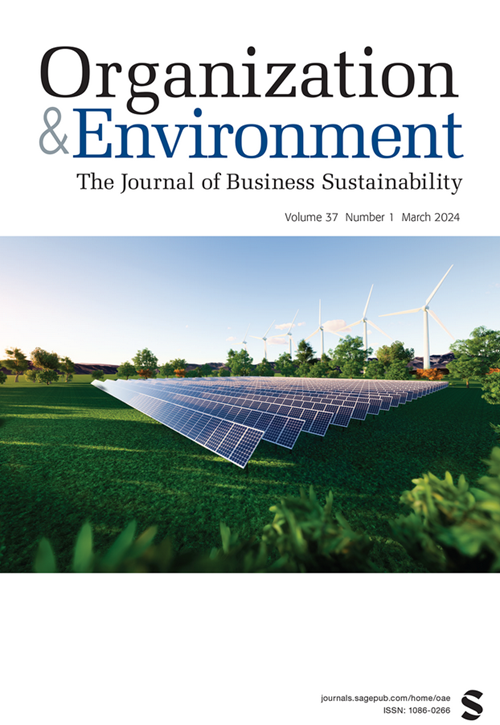应对棘手问题:时间、地点感和组织边界如何影响公司的去碳化战略
IF 7.3
4区 管理学
Q1 ENVIRONMENTAL STUDIES
引用次数: 0
摘要
越来越多的公司承诺为实现《巴黎协定》的目标做出贡献,制定 2050 年净零排放目标。然而,相关文献缺乏对企业实现这些目标的战略及其基本假设的深入分析。学者们越来越多地将时间和空间作为功能性建构来理论化不同企业应对气候变化的动机。在分析企业的气候行动时,组织边界是一个额外的关键维度。因此,我们采用了一个新颖的三维框架(时间、地点感和组织边界)来分析企业设定的目标与其提出的去碳化战略之间的联系。我们对 45 家被评为气候行动领导者的欧洲制造企业的自我报告和第三方数据进行了定性内容分析。通过调查时间、地点感和组织边界如何证实公司的去碳化战略对当前和未来可能产生的影响,我们勾勒出了这三个维度的不同方法如何促进或限制净零战略的全面性。本文章由计算机程序翻译,如有差异,请以英文原文为准。
Responding to a Wicked Problem: How Time, Sense of Place, and Organisational Boundaries Shape Companies’ Decarbonisation Strategies
A rapidly expanding number of companies have pledged to contribute towards the Paris Agreement’s goal by establishing 2050 net-zero emissions targets. However, the literature lacks an in-depth analysis of firms’ strategies to reach those targets and their underlying assumptions. Scholars increasingly use time and space as functional constructs to theorise what motivates different business responses to climate change. Organisational boundaries represent an additional critical dimension when analysing companies’ climate actions. Hence, we adopted a novel tri-dimensional framework (time, sense of place, and organisational boundaries) to analyse the link between the targets companies set and their proposed decarbonisation strategies. We conducted a qualitative content analysis of self-reported and tertiary data from 45 European manufacturing companies rated as leaders in climate action. By investigating how time, sense of place, and organisational boundaries substantiate companies’ decarbonisation strategies’ present and possible future impact, we delineate how different approaches to the three dimensions enable or constrain the comprehensives of net-zero strategies.
求助全文
通过发布文献求助,成功后即可免费获取论文全文。
去求助
来源期刊

Organization & Environment
Multiple-
CiteScore
11.20
自引率
5.70%
发文量
19
期刊介绍:
Organization & Environment encourages informed discussion about the social roots and consequences of environmental problems and stimulates deeper reflection on the meaning and significance of the natural world. By critically examining the impact of human production and consumption systems on the natural environment, Organization & Environment develops new perspectives on organizations that encourage environmentally sensitive reflection, inquiry, and practice.
 求助内容:
求助内容: 应助结果提醒方式:
应助结果提醒方式:


